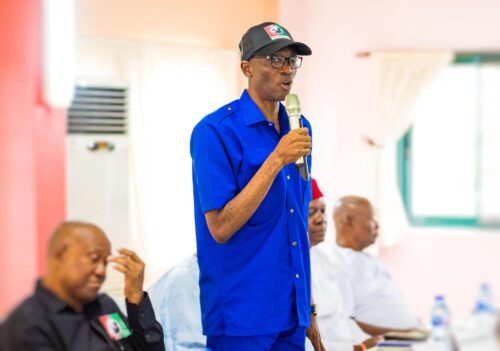Why Nigerian Power Sector May Remain In Darkness

Millions of Nigerians may have to endure low power generation and distribution. This is because nine of the nation’s 27 power plants have been idle, leaving a total generation capacity of 2,079.1 megawatts stranded. Thus, the total power generation in the country stands at 3,269.6MW.
Recent figures obtained from the Nigerian Electricity System Operator showed an increase in power generation, with peak generation of 4,803.20 MW and lowest generation of 2,890.90 MW.
But industry experts and financial analysts bemoaned the low power generation, noting that countries like South Africa with a smaller population, and Egypt, with a population of 78 million, people were generating 36,000 MW per day respectively.
READ ALSO: Osinbajo, NASS leaders confer on botched electricity tariff hike
Barely a week now, the system operator’s data showed there were idle plants, which included five of those built under the National Integrated Power Project, namely Alaoji, Olorunsogo II, Omotosho II, Ihovbor and Gbarain.
Other plants that did not produce any megawatt of electricity last week Thursday were Afam IV & V, Ibom Power, AES and ASCO.
The shutdown of the power plants was attributed to gas constraint, low load demand by the distribution companies, maintenance, frequency response and rupturing of gas pipeline, among others.
This was as stakeholders said the power sector privatisation that birthed the 23 Generation Companies (Gencos) and 11 Distribution Companies (Discos) was allegedly fraudulent from the onset.
Responding to enquiries by our correspondent, a financial Engineer/CEO at Wyoming Capital & Partners, and a Consultant/Dealer with Valmon Securities Limited, Tajudeen Olayinka, pointed out that the entire structure of power supply system in Nigeria is faulty.
According to him, the structure we have does not offer incentives for competition, especially at the distribution level, thus making performance at every level of power delivery system suboptimal.
Noting that the failure of the distribution segment is responsible for the failure of other segments of the power delivery chain, he said: “The privatization of the sector was not properly conceived by the administration of former President Jonathan. Those who acquired the legacy power companies across board did not have sufficient capacity to manage the system; either from the point of view of requisite financial resources, or other necessary resources.
“The privatization of the sector was a necessity at the time, and must still be pursued by the government, but the particular exercise that produced the current structure was a colossal failure; not well thought out and not well designed.”
On the impact of power failure on the nation’s economy, he said: “It has made it difficult for the managers of the economy to drive the much-needed non-inflationary growth through the supply-side of the economy, thus making Nigerian economy less competitive in the global arena.
He, however, noted that the then government who sanctioned the power sector privatization should have conducted a proper audit of the system and ensured that appropriate due-diligence was carried out on the entire power supply chain, to establish the appropriateness of available system delivery capacity on the ground, and those to be sourced externally.
Also, an economist, Prof. Uche Uwaleke, said the power sector problem is escalating due to the inability of the country to diversify its power sources. According to him, these challenges are made worse by the inability of the country to diversify the power sector’s reliance on the National Grid infrastructure, to the extent that we have become a generator-driven economy.
“As such, this is costing the nation so much. It has stunted growth of SMEs stifled ease of doing Business and discouraged foreign investments. It goes without saying that incessant power outages contribute to low GDP growth and high unemployment rate. Also, the generator-economy has been partly responsible for the increase in prices of goods and services worsening inflationary pressure,” he said.
Uwaleke said the solution to the perennial problem of power outage is to have a law in place empowering power generation at sub-national levels. “The way forward is to diversify the power sector and put in place necessary legislation that will empower States and Local Governments to generate and distribute power especially relying on off-grid solutions and alternative sources of energy such as Solar, coal, among many others,” he said.
In an exclusive telephone chat Mr Emmanuel Akoh, a retired staff of the National Electricity Power Authority (NEPA), said: “The federal government should be held responsible for turning deaf ear to suggestions by experts and stakeholders in the sector on the need to explore power generation using coal but rather choose to take the option of gas which has proven to be a failure.”
He said further: “The problem lies in our inability to diversify because we have so much relied on gas to supply power without exploring other sources of power generation. For instance, we have about five states that have a huge deposit of coal but they lie unexplored while countries like South Africa generate more than twenty thousand megawatts of electricity from coal.”
On his part, Director of the Energy Access Project at Duke University, Mr Jonathan Philips blamed the development on inconsistent enforcement of rules and policies reinforces.
He explained: “In the quest for incremental power, we must not overlook the things we have done poorly in the past. They range from improperly erected distribution poles characterized by poor quality materials, poor workmanship, and poor standards by local and foreign contractors who were employed to deliver the services and did not give us value for money.
“We must look at cable theft, vandalization of pipelines and transformers, power theft by consumers who use energy without meters or consumers who pay unscrupulous people who help bypass meters.
“We must look at court disputes, and protests and those who attack the efficiency of the power system in order to resolve grievances. We must resolve that these will not happen again in our road map for change.”










